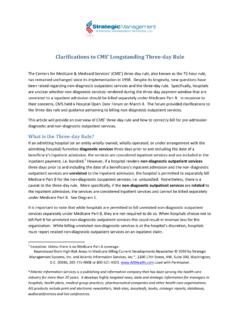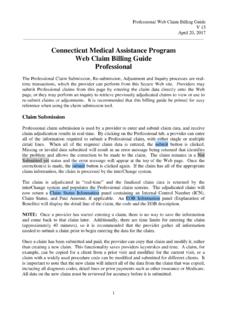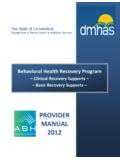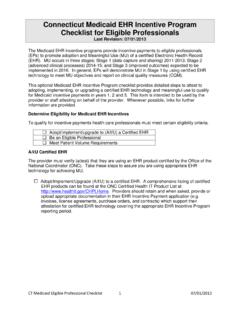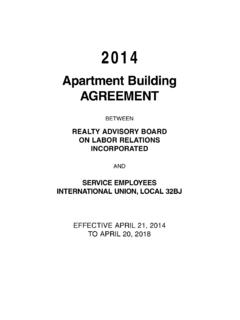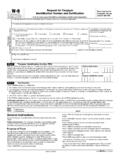Transcription of SANCTION SCREENING: OIG HIGH RISK PRIORITY Overview
1 SANCTION SCREENING: OIG HIGH RISK PRIORITY . Overview Healthcare organizations and entities have as a Condition of Participation the affirmative duty to screen all those with whom they have a business relationship against published SANCTION data. This includes but is not limited to employees, physicians given staff privileges, vendors, and contractors. As such, individuals being considered for employment by human resource management represent only a small part of the whole equation. The Department of Health and Human Services (DHHS) Office of Inspector General (OIG) has as their mission to root out fraud, waste, and abuse in the Department programs. In furtherance of this, they investigate violations of law and regulation that are presented for prosecution through the Department of Justice (DOJ).
2 They also have seventeen separate SANCTION authorities for administrative prosecution and action. Under the Title 42 USC section 1128 of the Social Security Act, the OIG has mandatory and permissible SANCTION authority to exclude individuals and entities from participation in federally financed health care programs, including Medicare, Medicaid, and Child Maternal Care for various types of misconduct, such as: Conviction for program related crimes;. Felony conviction for health care fraud;. Conviction related to patient abuse and/or neglect;. Failure to repay Health Education Assistance Loans;. Conviction related to fraud against non health care programs;. Misdemeanor conviction for controlled substances;. License revocation or suspension; and Misdemeanor health fraud conviction.
3 It is important to underscore the fact that no payment will be made for any items or services furnished by an excluded provider under the Medicare and Medicaid programs. Submitting such claims wherein any portion is attributable to an excluded individual or entity can be considered false and potentially fraudulent. In addition to facing the DOJ initiated actions, the OIG has independent authorities to seek civil monetary penalty action through the administrative processes of DHHS. Penalties for violating the Federal False Claims Act can be up to three times the value of the false claim, plus $5,500 to $11,000 in fines, per claim and program exclusion. During 2008 through 2009 the OIG have settled 29 civil monetary penalty cases, majority are self.
4 Disclosures, related to employing or contracting of excluded individuals. See Graph 1. Among these Reproduced from High Risk Areas in Medicare Billing Current Developments Newsletter 2010 by Strategic Management Systems, Inc. and Atlantic Information Services, Inc.*, 1100 17th Street, NW, Suite 300, Washington, 20036, 202 775 9008 or 800 521 4323. with Permission. *Atlantic Information Services is a publishing and information company that has been serving the health care industry for more than 20 years. It develops highly targeted news, data and strategic information for managers in hospitals, health plans, medical group practices, pharmaceutical companies and other health care organizations. AIS products include print and electronic newsletters, Web sites, looseleafs, books, strategic reports, databases, audioconferences and live conferences.
5 2 . cases, the OIG collected over $5 million in settlements. These settlements illustrate the OIG's continued effort to ensure compliance with sanctions screening. 1. Graph 1: Civil Monetary Penalty Cases Related to Employing or Contracting Excluded Indivduals. 20 17. Number of Cases 15 12. 10 5. 5. 0. 2008 2009 2010. Year The Impact of Not Complying Chapter 42, section (b) of the Code of Federal Regulations states that: [N]o payment will be made by Medicare, Medicaid, or any of the other federal health care programs for any items or service furnished by an excluded individual or entity, or at the medical direction or on the prescription of a physician or other authorized individual who is excluded when the person furnishing such item or service knew or had reason to know of the This payment ban applies to all methods of Federal program reimbursements including claims, cost reports, fee schedules, and prospective payment systems.
6 Further, the payment restriction can affect any payment used to cover an excluded individual's salary, expenses, or fringe benefits regardless if he/she provides direct patient care. Additionally, any payment for administrative and management services not directly related to patient care but necessary to provide an item and/or service to beneficiaries is affected by this restriction. To comply with these provisions, hospitals are strongly discouraged from employing or contracting with excluded individuals or entities to reduce potential liability. Hospitals should conduct SANCTION screenings prior to hiring or contracting with an individual or entity and periodically thereafter for all affected parties. Generally, sanctions screening for new employee hires is conducted by human resource management as part of the background check.
7 In addition, similar checks should be made for physicians applying for staff privileges by the credentialing committee, as well as those responsible for 1. Figures based on data provided on OIG's website: Accessed on 15 Jul. 2010. 2. 42 CFR (b). Reproduced from High Risk Areas in Medicare Billing Current Developments Newsletter 2010 by Strategic Management Systems, Inc. and Atlantic Information Services, Inc., 1100 17th Street, NW, Suite 300, Washington, 20036, 202 775 9008 or 800 521 4323. with Permission. 3 . contracting for services and products. Failure to conduct a thorough review by all these parties can have a negative impact on the whole organization; including potentially having CMS revoking an organization's billing privileges.
8 As such, it is imperative that all hospitals fully understand the implications of not complying with these provisions. Can't Afford Failure to Check SANCTION Data The OIG has in all their compliance guidance documents noted that one of the compliance officer's primary responsibilities is ensuring that the OIG List of Excluded Individuals and Entities (LEIE)3 has been checked with respect to all employees, medical staff, and independent contractors. They have been increasing their focus on taking action against those that bill for items and/or services furnished by excluded providers. As a result, the OIG's position is that when a health care entity has billed for services rendered by an excluded individual or entity, it is an actionable offense.
9 Thus, the burden is squarely upon hospitals and other health care entities to ensure that claims submitted to Medicare or Medicaid are not related to items and/or services provided by excluded individuals or entities. There are several enforcement initiatives underway to ensure compliance with sanctions screening. For example, the OIG is considering a national initiative to identify and recover payments to entities that collected reimbursement from [excluded] employees. 4 Moreover, there are a number of projects at both the federal and state level focusing on this, including the following: Where Are They Now? This is a new data mining project that is managed by New York's Office of Medicaid Inspector General (OMIG). Under this project, the OMIG will use search programs to identify excluded providers and contractors ( doctors, nurses, pharmacists, etc.)
10 Through the medical billing system. Specifically, this project will identify excluded providers who are submitting false claims. This project will begin in the next six months. Excluded Provider Project. This project started in 2008 and is a joint effort between the OIG. and the attorneys' offices in New England. Similar to the project above, the OIG and attorneys' offices identify entities submitting claims for items and/or services rendered by excluded providers. According to a press release, more than $1 million of improper payments have been recovered in the New England region under this project. Patient Affordable Care Act (PPACA). Section 6401(b)(d) of the PPACA requires CMS to establish a process to inform state Medicaid and Children's Health Insurance Program (CHIP).
